八年级英语上学期反意疑问句
- 格式:ppt
- 大小:424.00 KB
- 文档页数:36
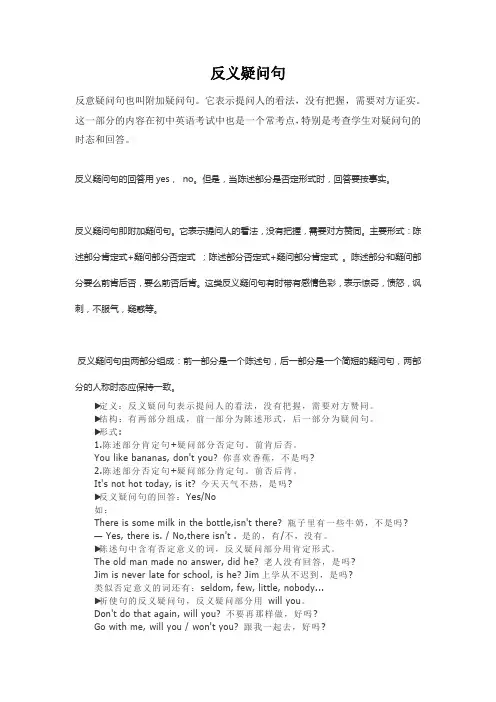
反义疑问句反意疑问句也叫附加疑问句。
它表示提问人的看法,没有把握,需要对方证实。
这一部分的内容在初中英语考试中也是一个常考点,特别是考查学生对疑问句的时态和回答。
反义疑问句的回答用yes,no。
但是,当陈述部分是否定形式时,回答要按事实。
反义疑问句即附加疑问句。
它表示提问人的看法,没有把握,需要对方赞同。
主要形式:陈述部分肯定式+疑问部分否定式;陈述部分否定式+疑问部分肯定式。
陈述部分和疑问部分要么前肯后否,要么前否后肯。
这类反义疑问句有时带有感情色彩,表示惊奇,愤怒,讽刺,不服气,疑惑等。
3反义疑问句由两部分组成:前一部分是一个陈述句,后一部分是一个简短的疑问句,两部分的人称时态应保持一致。
▶定义:反义疑问句表示提问人的看法,没有把握,需要对方赞同。
▶结构:有两部分组成,前一部分为陈述形式,后一部分为疑问句。
▶形式:1.陈述部分肯定句+疑问部分否定句。
前肯后否。
You like bananas, don't you? 你喜欢香蕉,不是吗?2.陈述部分否定句+疑问部分肯定句。
前否后肯。
It's not hot today, is it? 今天天气不热,是吗?▶反义疑问句的回答:Yes/No如:There is some milk in the bottle,isn't there? 瓶子里有一些牛奶,不是吗?— Yes, there is. / No,there isn't . 是的,有/不,没有。
▶陈述句中含有否定意义的词,反义疑问部分用肯定形式。
The old man made no answer, did he? 老人没有回答,是吗?Jim is never late for school, is he? Jim上学从不迟到,是吗?类似否定意义的词还有:seldom, few, little, nobody...▶祈使句的反义疑问句,反义疑问部分用will you。
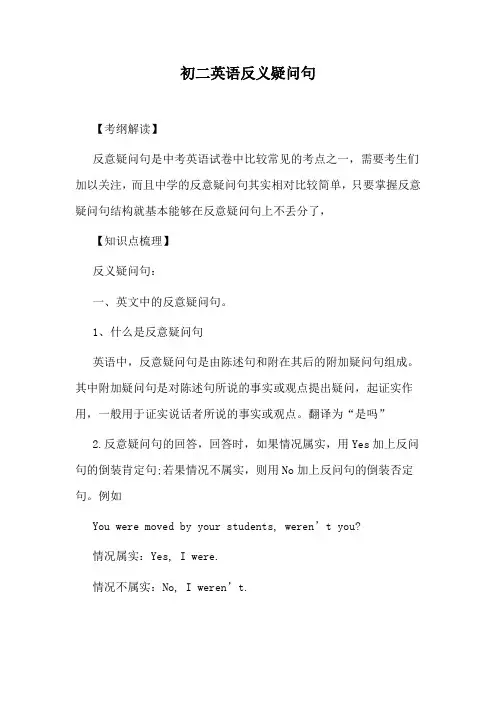
初二英语反义疑问句【考纲解读】反意疑问句是中考英语试卷中比较常见的考点之一,需要考生们加以关注,而且中学的反意疑问句其实相对比较简单,只要掌握反意疑问句结构就基本能够在反意疑问句上不丢分了,【知识点梳理】反义疑问句:一、英文中的反意疑问句。
1、什么是反意疑问句英语中,反意疑问句是由陈述句和附在其后的附加疑问句组成。
其中附加疑问句是对陈述句所说的事实或观点提出疑问,起证实作用,一般用于证实说话者所说的事实或观点。
翻译为“是吗”2.反意疑问句的回答,回答时,如果情况属实,用Yes加上反问句的倒装肯定句;若果情况不属实,则用No加上反问句的倒装否定句。
例如You were moved by your students, weren’t you?情况属实:Yes, I were.情况不属实:No, I weren’t.二、反意疑问句中问句部分的动词与陈述部分的动词在语气上成相反的对应关系,即:肯定+否定? 否定+肯定?如:① You can’t do it, can you?你不能做它,是吗?②They are very late for the meeting, aren’t they?他们开会迟到了,是吗?三.当陈述句中含有be动词,助动词,或是情态动词时,反问句部分由这些词加上主语人称代词构成,Be动词包括:am, is, are, was, were助动词有:do, does, did, have(用在完成时), has(用在完成时)等情态动词有:can, could, may, might, must, will, would, shall, should例如:She is a lovely girl, isn’t she?她是一个可爱的女孩,是吗?He will go home, __won’t__ __he__?他要回家了,是吗?She doesn’t like to eat popcorn, __does__ _she___?她不喜欢吃爆米花,是吗?The baby won’t sleep early, will it?小宝宝睡得不早,是吗?注意:①He has supper at home every day, doesn’t’t he? (不能用hasn’t he?)他每天在家吃晚饭,是吗?② They have known the matter, haven’t they? (不能用don’t they?)他们已经知道那事情了,是吗?四.当陈述句中只含有行为动词时,若动词加了s,就用does, 若动词为原形,就用do,动词为过去式,则用did,例如:You cleaned your house last week, _didn’t___ __you__?你上周打扫了你的房间,是吗?Your father plays the computer very well, __doesn’t__ ___he _?你父亲电脑技术很好,是吗?They look so happy today, _don’t ___ _they___?你今天看起来很高兴,是吗?五.反意疑问句的陈述部分带有little, few, never, hardly, seldom,nobody, nothing, barely, scarcely等否定意义的词时,问句部分用肯定式。
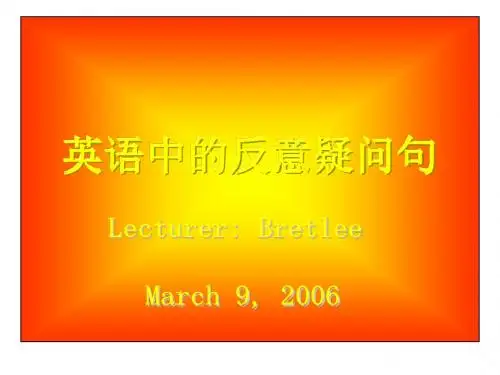
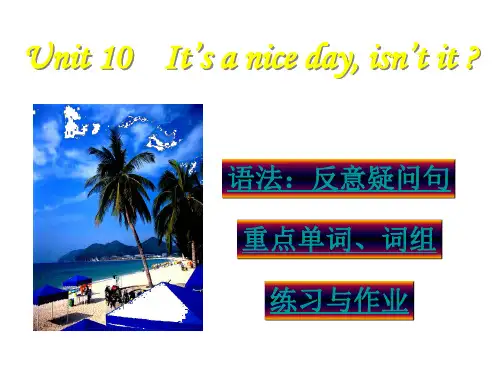
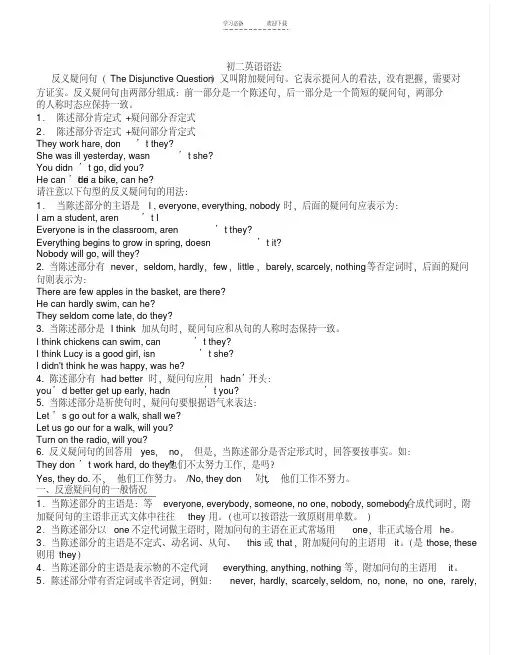
学习必备欢迎下载初二英语语法反义疑问句(The Disjunctive Question)又叫附加疑问句。
它表示提问人的看法,没有把握,需要对方证实。
反义疑问句由两部分组成:前一部分是一个陈述句,后一部分是一个简短的疑问句,两部分的人称时态应保持一致。
1.陈述部分肯定式+疑问部分否定式2.陈述部分否定式+疑问部分肯定式They work hare, don’t they?She was ill yesterday, wasn’t she?You didn’t go, did you?de a bike, can he?He can’t ri请注意以下句型的反义疑问句的用法:1.当陈述部分的主语是I , everyone, everything, nobody 时,后面的疑问句应表示为:I am a student, aren’t IEveryone is in the classroom, aren’t they?Everything begins to grow in spring, doesn’t it?Nobody will go, will they?2. 当陈述部分有never,seldom, hardly,few,little,barely, scarcely, nothing 等否定词时,后面的疑问句则表示为:There are few apples in the basket, are there?He can hardly swim, can he?They seldom come late, do they?3. 当陈述部分是I think 加从句时,疑问句应和从句的人称时态保持一致。
I think chickens can swim, can’t they?I think Lucy is a good girl, isn’t she?I didn't think he was happy, was he?开头:4. 陈述部分有had better 时,疑问句应用hadn’tyou’d better get up early, hadn’t you?5. 当陈述部分是祈使句时,疑问句要根据语气来表达:Let’s go out for a walk, shall we?Let us go our for a walk, will you?Turn on the radio, will you?6. 反义疑问句的回答用yes,no,但是,当陈述部分是否定形式时,回答要按事实。
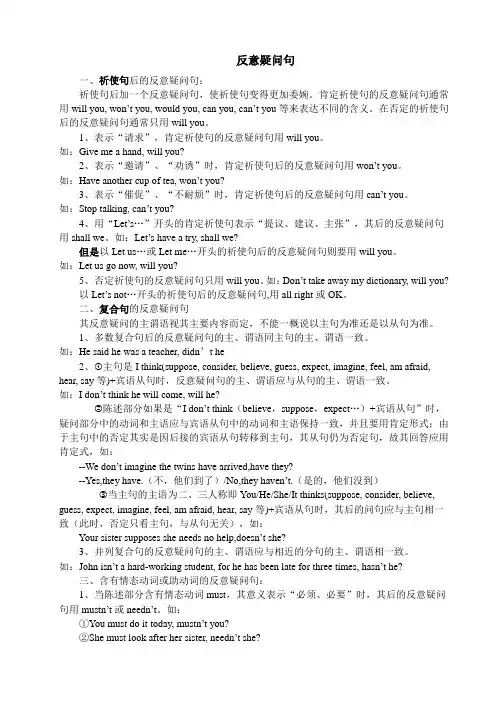
反意疑问句一、祈使句后的反意疑问句:祈使句后加一个反意疑问句,使祈使句变得更加委婉。
肯定祈使句的反意疑问句通常用will you, won’t you, would you, can you, can’t you等来表达不同的含义。
在否定的祈使句后的反意疑问句通常只用will you。
1、表示“请求”,肯定祈使句的反意疑问句用will you。
如:Give me a hand, will you?2、表示“邀请”、“劝诱”时,肯定祈使句后的反意疑问句用won’t you。
如:Have another cup of tea, won’t you?3、表示“催促”、“不耐烦”时,肯定祈使句后的反意疑问句用can’t you。
如:Stop talking, can’t you?4、用“Let’s…”开头的肯定祈使句表示“提议、建议、主张”,其后的反意疑问句用shall we。
如:Let’s have a try, shall we?但是以Let us…或Let me…开头的祈使句后的反意疑问句则要用will you。
如:Let us go now, will you?5、否定祈使句的反意疑问句只用will you。
如:Don’t take away my dictionary, will you?以Let’s not…开头的祈使句后的反意疑问句,用all right或OK。
二、复合句的反意疑问句其反意疑问的主谓语视其主要内容而定,不能一概说以主句为准还是以从句为准。
1、多数复合句后的反意疑问句的主、谓语同主句的主、谓语一致。
如:He said he was a teacher, didn’t he2、①主句是I think(suppose, consider, believe, guess, expect, imagine, feel, am afraid, hear, say等)+宾语从句时,反意疑问句的主、谓语应与从句的主、谓语一致。
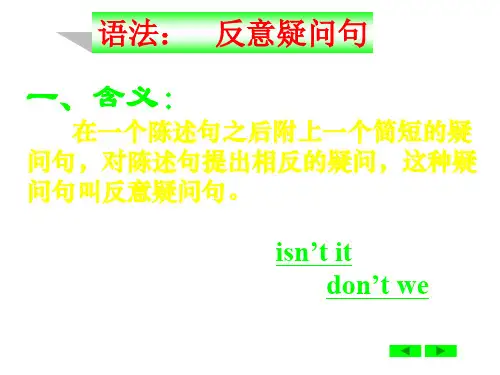
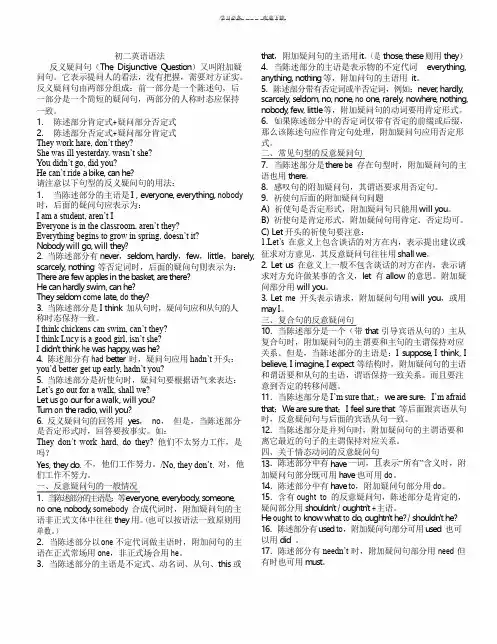
(初二英语语法反义疑问句(The Disjunctive Question )又叫附加疑 问句。
它表示提问人的看法,没有把握,需要对方证实。
反义疑问句由两部分组成:前一部分是一个陈述句,后 一部分是一个简短的疑问句,两部分的人称时态应保持 一致。
1. 陈述部分肯定式+疑问部分否定式 2. 陈述部分否定式+疑问部分肯定式 They work hare, don’t they?She was ill yesterday, wasn’t she? You didn’t go, did you?He can’t ri de a bike, can he?请注意以下句型的反义疑问句的用法:1. 当陈述部分的主语是 I , everyone, everything, nobody 时,后面的疑问句应表示为: I am a student, aren’t IEveryone is in the classroom, aren’t they?Everything begins to grow in spring, doesn’t it? N obody will go, will they ?2. 当陈述部分有 never ,seldom, hardly ,few ,little ,barely , scarcely, nothing 等否定词时,后面的疑问句则表示为: There are few apples in the basket, are there? He can hardly swim, can he?They seldom come late, do they ?3. 当陈述部分是 I think 加从句时,疑问句应和从句的人 称时态保持一致。
I think chickens can swim, can’t they? I think Lucy is a good girl, isn’t she? I didn 't think he was happy , was he?4. 陈述部分有 had better 时,疑问句应用 hadn’t 开头: you’d better get up early, hadn’t you?5. 当陈述部分是祈使句时,疑问句要根据语气来表达: Let’s go out for a walk, shall we? Let us go our for a walk, will you? T urn on the radio, will you?6. 反义疑问句的回答用 yes , no , 但是,当陈述部分 是否定形式时,回答要按事实。
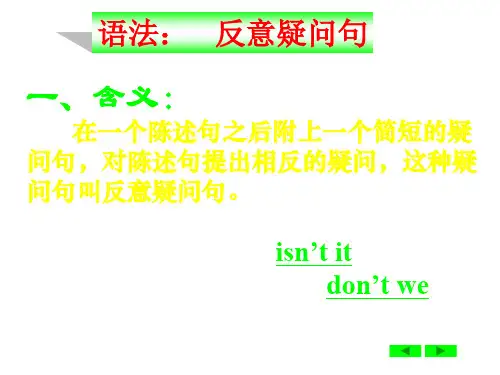
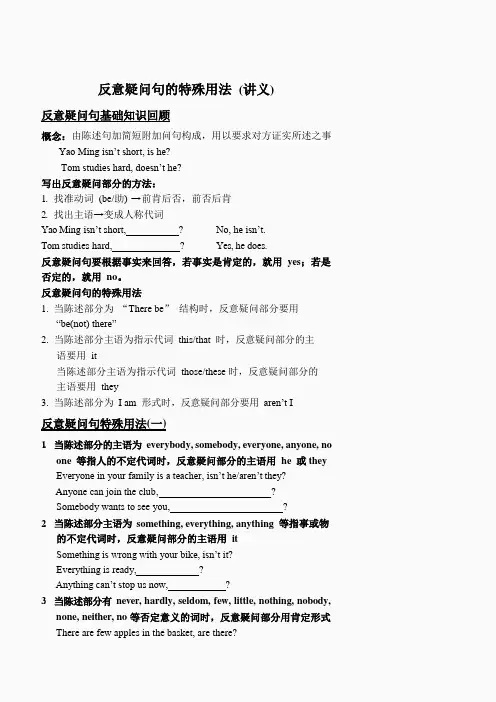
反意疑问句的特殊用法(讲义)反意疑问句基础知识回顾概念:由陈述句加简短附加问句构成,用以要求对方证实所述之事Yao Ming isn’t short, is he?Tom studies hard, doesn’t he?写出反意疑问部分的方法:1.找准动词(be/助) →前肯后否,前否后肯2.找出主语→变成人称代词Yao Ming isn’t short, ? No, he isn’t.Tom studies hard, ? Yes, he does.反意疑问句要根据事实来回答,若事实是肯定的,就用yes;若是否定的,就用no。
反意疑问句的特殊用法1.当陈述部分为“There be”结构时,反意疑问部分要用“be(not) there”2.当陈述部分主语为指示代词this/that 时,反意疑问部分的主语要用it当陈述部分主语为指示代词those/these 时,反意疑问部分的主语要用they3.当陈述部分为I am 形式时,反意疑问部分要用aren’t I反意疑问句特殊用法(一)1.当陈述部分的主语为everybody, somebody, everyone, anyone, noone 等指人的不定代词时,反意疑问部分的主语用he 或they Everyone in your family is a teacher, isn’t he/aren’t they?Anyone can join the club, ?Somebody wants to see you, ?2.当陈述部分主语为something, everything, anything 等指事或物的不定代词时,反意疑问部分的主语用itSomething is wrong with your bike, isn’t it?Everything is ready, ?Anything can’t stop us now, ?3.当陈述部分有never, hardly, seldom, few, little, nothing, nobody,none, neither, no 等否定意义的词时,反意疑问部分用肯定形式There are few apples in the basket, are there?He can hardly swim, ?No one left here yesterday, ?Nothing could make me give it up, ?注意:当陈述部分有unhappy, dislike, careless 等含un-, dis-, no-…否定前缀或-less…否定后缀的词时,要将其当作肯定含义,反意疑问部分要用否定形式He looks unhappy, doesn’t he?It is unfair, ?You disagree with me, ?The boy is too careless, ?反意疑问句特殊用法(二)4.陈述部分为祈使句肯定句Look at the blackboard, will you /won’t you?否定句Don’t watch TV, will you?Let’s (包含听话者) Let’s play football, shall we?Let us (不包含听话者) Let us know your name, will you?Open the door, ?Don’t do that, ?Let’s go to the park, ?Let us live here, ?5.当陈述部分为感叹句时,反意疑问部分要根据感叹句中的主语和谓语来确定What a beautiful city Qingdao is, isn’t it?How hard Tom works, ?How fast Lily ran, ?6.陈述部分若为主从复合句,反意疑问部分的主语通常与主句的主语一致,如:I said the box was heavy, didn’t I?She thinks the bike belongs to David, doesn’t she?但当主句的主语为第一人称I/we,其谓语动词又是think,believe, suppose, imagine 等时,反意疑问部分的主语和谓语要与从句一致I think the box is heavy, isn’t it?I don’t think the bike belongs to David, does it?否定转移I believe she says so, ?I didn’t know she liked it, ?He said Lily was wrong, ?I don’t think she is right, ?Tom’s mother thinks Tom is careless, ?We supposed she was happy to see us, ?反意疑问句特殊用法(三)7.当陈述部分含有must 时分两种情况:①表“必须”时,反意疑问部分的谓语否定式用needn’t②表猜测,意为“一定”时,反意疑问部分谓语动词应根据must后边的动词来确定You must go to the bank, ?Lily must be hungry, ?8.当陈述部分含有need 时分两种情况:①当need 是实义动词时,反意疑问部分的动词应用助动词do②当need 是情态动词时,反意疑问部分的动词应用needHe needs to buy some bread, ?He needn’t go there today, ?9.当陈述部分含有have 时,分以下情况:①当have 作为实义动词表“有”或“吃、喝、玩、度过”等意思时,反意疑问部分的谓语应用助动词doTom has a dog, ?They had a good time last weekend, ?②在“have to(不得不)”结构中,反意疑问部分的谓语用助动词doJack has to go home now, ?③在“had better(最好)”结构中,反意疑问部分的谓语动词用hadYou’d better take the bus there, ?④表完成的概念时,反意疑问部分的谓语动词用haveShe has finished her homework, ?Exercises一、单选( )1. Everybody is here, ?A. isn’t itB. is heC. are theyD. isn’t he ( )2. Nothing is difficult if you put your heart into it, ?A. aren’t theyB. isn’t itC. is itD. are they( )3. He hardly goes to school by car, he?A. doesB. doesn’tC. isD. isn’t ( )4. There is little milk in the fridge, ?A. is thereB. isn’t thereC. isn’t itD. is it ( )5. —Your father never watches the drama series on TV, ?—. He thinks these drama series are boring and dull.A. does he; Yes, he doesB. does he; No, he doesn’tC. doesn’t he ; Yes, he doesD. doesn’t he ; No, he doesn’t ( )6. —Jim had nothing for breakfast this morning, ?—. He got up too late.A. had he; YesB. hadn’t he; YesC. did he; NoD. did he; Yes( )7. Your brother is always careless, ?A. is itB. isn’t youC. is heD. isn’t he ( )8. —Your brother often disagrees with you, he?—. We often have different opinions.A. does, YesB. doesn’t; YesC. does; NoD. doesn’t; No( )9. You’ve just finished your listening exam. Please get yourself ready for the next part, ?A. shall weB. will youC. do youD. are you( )10. —Don’t smoke in the reading room, ?—I’m sorry. I won’t do it again.A. will youB. shall weC. do youD. won’t you( )11. We forgot to bring our tickets, but please let us enter, ?A. do youB. shall weC. will youD. don’t you( )12. —It’s sunny today. Let’s go mountain climbing, ?—Good idea!A. shall weB. will youC. won’t youD. do you ( )13. What a sunny day it is, ?A. is itB. isn’t itC. is heD. isn’t he ( )14. I explained (解释) why I was late, ?A. was IB. wasn’t IC. did ID. didn’t I( )15. I think she likes Beijing, ?A. don’t IB. does sheC. doesn’t sheD. isn’t she( )16. I don’t think she will agree with us, ?A. will sheB. won’t sheC. do ID. don’t I( )17. You must be an English teacher, ?A. mustn’t youB. needn’t youC. aren’t youD. be not you( )18. Lily needn’t buy that book, ?A. need sheB. needn’t sheC. does sheD. doesn’t she( )19. You had better not watch TV now, ?A. had youB. hadn’t youC. do youD. have you( )20. Maria has few friends in China, ?A. doesn’t sheB. has sheC. does sheD. hasn’t she二、将下列反意疑问句补充完整21.Jim never goes to the movies on Saturday, ?22.Let us go to fly kites in the park, ?23.Don’t forget to phone me, ?24.Someone is waiting for you, ?25.Everything goes well, ?26.Please clean your room this afternoon, ?27.Lucy has to go to school on foot, ?28.John had fish for lunch yesterday, ?29.Bruce has nothing to do now, ?30.E-mail is very popular today. People seldom write letters now,?【参考答案】反意疑问句基础知识回顾写出反意疑问部分的方法:is he;doesn’t he反意疑问句特殊用法(一)1.can’t he / can’t they;doesn’t he / don’t they2.isn’t it;can it3.can he;did he / did they;could it注意:isn’t it;don’t you;isn’t he反意疑问句特殊用法(二)4.will you / won’t you;will you;shall we;will you5.doesn’t he;didn’t she6.doesn’t she;did I;didn’t he;is she;doesn’t she;wasn’t she 反意疑问句特殊用法(三)7.needn’t you;isn’t she8.doesn’t he;need he9.doesn’t he;didn’t they;doesn’t he;hadn’t you;hasn’t she Exercises一、1—5:DCAAB 6—10:CDBBA11—15:CABDC 16—20:ACAAC二、21. does he 22. will you 23. will you24. isn’t he25. doesn’t it26. will/won’t you27. doesn’t she28. didn’t he29. does he30. do they。
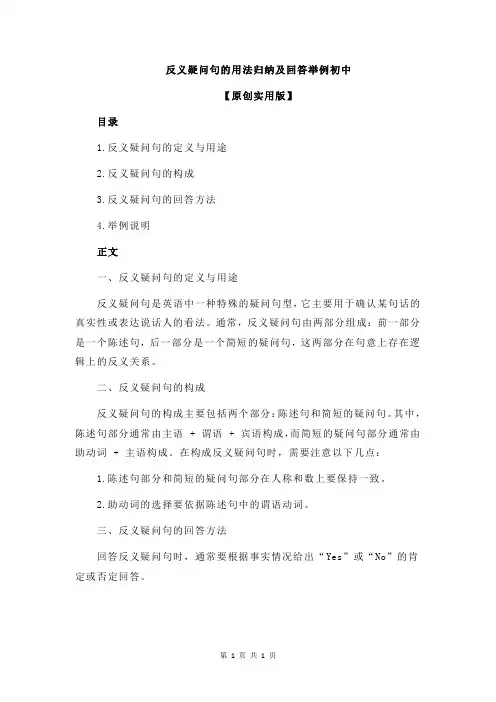
反义疑问句的用法归纳及回答举例初中
【原创实用版】
目录
1.反义疑问句的定义与用途
2.反义疑问句的构成
3.反义疑问句的回答方法
4.举例说明
正文
一、反义疑问句的定义与用途
反义疑问句是英语中一种特殊的疑问句型,它主要用于确认某句话的真实性或表达说话人的看法。
通常,反义疑问句由两部分组成:前一部分是一个陈述句,后一部分是一个简短的疑问句,这两部分在句意上存在逻辑上的反义关系。
二、反义疑问句的构成
反义疑问句的构成主要包括两个部分:陈述句和简短的疑问句。
其中,陈述句部分通常由主语 + 谓语 + 宾语构成,而简短的疑问句部分通常由助动词 + 主语构成。
在构成反义疑问句时,需要注意以下几点:
1.陈述句部分和简短的疑问句部分在人称和数上要保持一致。
2.助动词的选择要依据陈述句中的谓语动词。
三、反义疑问句的回答方法
回答反义疑问句时,通常要根据事实情况给出“Yes”或“No”的肯定或否定回答。
第1页共1页。
反义疑问句的14种常考特殊用法,初中生一定要掌握!反意疑问句也叫附加疑问句。
它表示提问人的看法,没有把握,需要对方证实。
这一部分的内容在初中英语考试中也是一个常考点,特别是考查学生对疑问句的时态和回答,跟着小简老师一起来看看初中英语中反意疑问句的14种特殊用法,初中生一定要知道!一、反意疑问句反意疑问句是由陈述句和附在其后的附加疑问句组成。
其中附加疑问句是对陈述句所说的事实或观点提出疑问,起证实作用,一般用于证实说话者所说的事实或观点。
(表示说话者对某事有一定看法,但又不完全确定,需要对方加以证实。
)翻译为“是吗”二、反意疑问句的回答回答时,事实是肯定的用Yes;若事实是否定的则用No。
三、反意疑问句的特殊情况1.反意疑问句中问句部分的动词与陈述部分的动词在语气上成相反的对应关系,即:肯定+否定?否定+肯定?You can’t do it, can you?你不能做它,是吗?They are very late for the meeting, aren’t they?他们开会迟到了,是吗?2.附加问句的主语应与陈述句的主语保持一致,且只能用人称代词替代。
You come from Beijing, don't you?你来自北京,是不是?3.当陈述句中含有be动词,助动词,或是情态动词时,反问句部分由这些词加上主语人称代词构成:Be动词包括:am, is, are, was, were助动词有:do, does, did, have(用在完成时), has(用在完成时)等情态动词有:can, could, may, might, must, will, would, shall, shouldHe will go home, won’t he?他要回家了,是吗?She doesn’t like to eat popcorn, does she?她不喜欢吃爆米花,是吗?4.have的不同用法,反义疑问句用不同的动词(1)have 表“有”时,反义疑问句谓语动词用have/do都行He has a new car, doesn’t/hasn’t he?(2)have表“吃,喝,玩,度过,举办”等是,反义疑问句谓语动词用doHe has supper at home every day, doesn’t he?They had a good time in Beijing, didn’t they?(3)have to表“不得不,必须”时,反义疑问句谓语动词用doKite has to help her mother, doesn’t she?(4)had better表“最好”时,反义疑问句谓语动词用hadWe had better go to school at once, hadn't we?(5)have用在完成时中,反义疑问句谓语动词用haveThey have known the matter, haven’t they?5.(1)反意疑问句的陈述部分带有little, few, never, hardly, seldom,nobody, nothing, no one, none, neither等否定意义的词时,问句部分用肯定式。
反义疑问句英语句型反义疑问句的形式是陈述句+疑问句。
前肯后否,或前否后肯。
例:1、You have seen my video, haven't you?2、You haven't seen my video, have you?那么英语中的反义疑问句有什么特点呢?现整理如下:一:反义疑问句的主语都是代词1.1陈述句there be 句型做主语,用there 做主语There are two cakes on the plate, aren' t there?碟子里有两块蛋糕,是吗?指示代词作主语,用it、they 做主语:指示代词this 或that 作主语时,反意疑问句的主语用it,当陈述部分的主语是指示代词these 或those 时,其反意疑问句的主语用they。
This is a plane, isn't it?这是一架飞机,是吗?These are grapes, aren't they?这些是葡萄,是吗?主语是复合不定代词(人)做主语,常用he/they 作主语:somebody (someone), anybody (anyone), nobody (no one), everybody (everyone) none, neither 时,问句部分的主语用he或they,这时问句动词的数应和he 或they 一致。
Someone has taken the seat, hasn't he?有人已经坐了位置,是吗?Everyone has done their best in the game, haven't they?每个人在比赛中已经尽力了,是吗?主语是复合不定代词(物)做主语,常用it 做主语:something, anything, nothing, everything时,问句部分的主语用it。
Something is wrong with the computer, isn't it?电脑有问题了,是吗?Nothing has happened to them, has it?他们什么事也没发生,是吗?反意疑问句的陈述部分为I am……时,问句部分习惯上用aren't I?I am a very honest man, aren't I?我是个很诚实的人,是吗?1.2祈使句若为let's引导,反问句用shall we?Lets go home together, shall we?让我们一起回家,好吗?若为let us/me引导和否定祈使句,都用will you?Let us stop to rest, will you?让我们停下休息,好吗?Don't make any noise, will you别弄出噪音,好吗?肯定祈使句则用will you 或won't you都行Do sit down, wont you? will you请坐,好吗?You feed the bird today, will you?今天你喂鸟,是吗?Please open the window, will you? / wont you?打开窗,好吗?1.3复合句陈述部分是主从复合句时:宾语从句、定语从句,反义疑问句主语常与主句主语一致。
初二英语反义疑问句试题1.Kate’s never late for school, ?A.isn’t she B.hasn’theC.is she D.has she【答案】C【解析】句意:凯特上学从来不迟到,是吗?根据never可知前面主句否定形式,故此处用肯定形式。
因为谓语是is,故此处为is she。
故选C。
【考点】考查反义疑问句的用法。
2.—He’s never seen the film Rio2 (里约大冒险2) before, _________ he?—_________. He went to see it last week.A.has; Yes B.has; NoC.hasn’t; Yes D.hasn’t; No【答案】A【解析】句意:他从来没有看过《里约大冒险2》这部电影,对吗?不,他上周看了。
反意疑问句遵循前肯后否,前否后肯的原则,前句中有never,属于否定形式,所以后句用肯定形式,排除C和D,由“他上周看了”可推断出此处应为肯定回答,用yes,故选A。
【考点】考查反意疑问句及其回答。
3. ---She’s never been to Hainan, ________?---________. She went there last week for the first time.A.has she; Yes, she has B.has she; No, she hasn’tC.hasn’t she; Yes, she has D.hasn’t she; No, she hasn’t【答案】A【解析】句意:—她从没去过海南,是不是?—不,她去过,上周她第一次去。
第一空是考查反意疑问句,陈述句中有never,所以简短问句用肯定形式;第二空是考查反意疑问句的回答,根据“根据事实,前后一致”原则,事实情况她去过,所以用肯定形式的回答,故选A。
【考点】考查反意疑问句4. ---- He’s never seen the film The Grand Master(一代宗师)before, _________he?---- _____________. He went to see it last week.A.has, Yes B.has, No C.hasn’t he, Yes D.hasn’t he, No【答案】A【解析】句意:——之前他从来都没有看过电影一代宗师,不是吗?——不,他上周去看了。
反义疑问句反义疑问句(The Disjunctive Question)又叫附加疑问句。
它表示提问人的看法,没有把握,需要对方证实。
反义疑问句由两部分组成:前一部分是一个陈述句,后一部分是一个简短的疑问句,两部分的人称时态应保持一致。
1.陈述部分肯定式+疑问部分否定式2.陈述部分否定式+疑问部分肯定式They work hare, don’t they?She was ill yesterday, wasn’t she?You didn’t go, did you?He can’t ride a bike, can he?请注意以下句型的反义疑问句的用法:1.当陈述部分的主语是I , everyone, everything, nobody 时,后面的疑问句应表示为:I am a student, aren’t I?Everyone is in the classroom, aren’t they?Everything begins to grow in spring, doesn’t it?Nobody will go, will they?2. 当陈述部分有never,seldom, hardly,few,little,barely, scarcely, nothing 等否定词时,后面的疑问句则表示为:There are few apples in the basket, are there?He can hardly swim, can he?They seldom come late, do they?3. 当陈述部分是I think 加从句时,疑问句应和从句的人称时态保持一致。
I think chickens can swim, can’t they?I think Lucy is a good girl, isn’t she?I didn't think he was happy, was he?4. 陈述部分有had better 时,疑问句应用hadn’t开头:you’d better get up early, hadn’t you?5. 当陈述部分是祈使句时,疑问句要根据语气来表达:Let’s go out for a walk, shall we?Let us go our for a walk, will you?Turn on the radio, will you?6. 反义疑问句的回答用yes,no,但是,当陈述部分是否定形式时,回答要按事实。